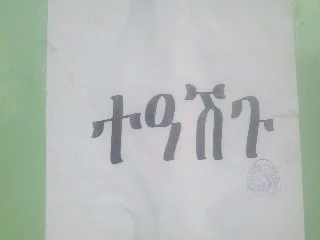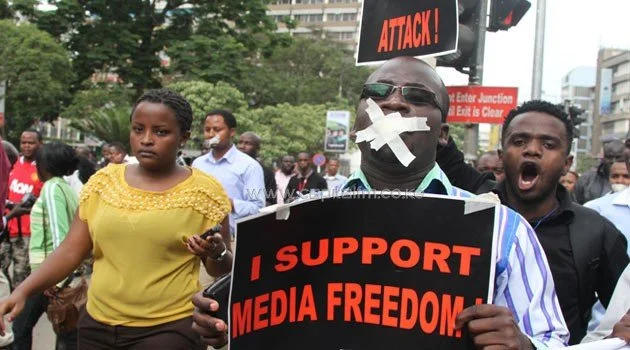TIMELINE: 6-Year Torture and Unjust Detention of Eritrean Journalist Yirgalem Fisseha Mebrahtu
Yirgalem Fisseha Mebrahtu (Amharic: ይርጋለም ፍስሃ መብራቱ; born in 1981) is recognized as one of Eritrea’s most talented poets, as well as a gifted writer and radio presenter. In 2009, she was detained by Eritrean authorities following a raid on Radio Bana, an educational radio station where she worked. The military detained over 30 journalists and staff members during the raid. While most were released after four years, Mebrahtu and five others endured six years of imprisonment without trial in one of Eritrea’s most notorious military prisons. Her unjust detention made her a powerful symbol of the Eritrean government's suppression of free expression, with her image widely circulated on social media and posters advocating for her release. Since 2018, Yirgalem has lived in exile in Munich, Germany.
2018
March
Mebrahtu manages to leave Eritrea and relocates to Munich, Germany.
“I was imprisoned because I was a writer. Just because they are writers, many Eritreans have been put in danger”
2017
Mebrahtu tries to escape from Eritrea but is caught at the border and sent back to prison for another four months.
2015
January 21
Mebrahtu is released from prison along with Bereket Misghina, Basilios Zemo from Radio Bana, and Meles Negusse Kiflu, who worked with both Radio Bana and Radio Zara, Girmay Abraham of Radio Dimtsi Hafash, and Petros Teferi.
2012
April 6
Mebrahtu is hospitalized for the third time in serious condition at Halibet Hospital. She remains constantly monitored by guards and is yet again not permitted to have any visitors. Her family is kept in the dark about the circumstances of her declining health, but her treatment necessitates obtaining medication from abroad.
January
Mebrahtu is admitted to the hospital a second time.
2011
November
Mebrahtu is hospitalized again in Asmara, the capital of Eritrea, and is in serious condition at Halibet Hospital. She is constantly monitored by guards and is not permitted to have any visitors.
March
“The violent beating continued until – and perhaps even after – I passed out. I do not remember when they stopped”
After spending five months in the hospital, she is returned to her prison cell in March, despite earlier rumors suggesting her imminent release due to concerns about her condition. During her time in the hospital, her health had significantly improved with the help of guards, fellow prisoner-patients, and the medical staff. She progressed from being moved around in a wheelchair to walking with crutches and eventually without them. Although there was speculation that her recovery might lead to her freedom, these hopes proved unfounded, and she was sent back to her cell.
2010
October 28
The head of the Adi-Abieto and Mai-Serwa prisons visits Mebrahtu to check on her health, asking if she has started eating. She takes this opportunity to confront him, recalling his role in her initial interrogation and criticizing the ongoing interrogations as baseless and aimed at implicating her in crimes she did not commit. She questions the justice of their actions, expressing frustration at being repeatedly asked the same questions for two years. Despite her efforts to provoke a response, the prison head avoids answering and only advises her to focus on her health.
October 23
Mebrahtu’s condition worsens, as she is in critical shape with bruises, swelling, and pain covering her entire body except for her stomach. She can barely move due to the pain. On Saturday, October 23, 2010, she is finally taken to Halibet Hospital. The emergency doctor struggles to find a vein for an IV due to the extent of her injuries and is shocked by the severity of her bruises and swelling from the torture.
October 21
Mebrahtu is summoned from her cell again, despite still being in severe pain from the previous day’s beating. They question her about a short story she wrote, inspired by a real incident involving a family fined after their son fled Eritrea and drowned while trying to reach Europe. Shifting topics, the interrogators cite lines from her poems and accuse her of using her work at Radio Bana to incite youth against the government. Despite her attempts to explain, the interrogators begin beating her again with a thick stick, and she collapses from the pain. They brutally kick and gag her, leaving her hogtied on the floor, threatening that she would die there. The violence continues until she loses consciousness. Later, Yirgalem wakes up in the prison compound, where guards take her to the prison clinic. Her condition worsens, but the authorities refuse to transfer her to Halibet Hospital, fearing public exposure.
October 20
A guard calls Yirgalem from her cell for an interrogation. She is taken to the prison head office, where two men wait—one a familiar senior interrogator known for his brutality, the other a family friend who works at the prison. The interrogator accuses her of writing against the Eritrean government and its people, pointing to her poems and a short story called "50 Qrshi" found on her laptop. Despite Yirgalem's explanations about the story's theme being a critique of youth migration and not an attack on the government, the interrogator becomes enraged and beats her with a club. Her attempts to plead for mercy, mentioning her heavy menstrual bleeding, are ignored. The brutal interrogation continues until she is finally sent back to her cell, severely bruised and in pain.
February 19
Authorities have placed Mebrahtu in solitary confinement at the May Srwa prison, north of Asmara, where she has been held for the past few weeks. They have not yet disclosed the reasons for this treatment.
2009
October
“A heavy-built man accompanied by a fully armed soldier stormed into our office as members were talking about the intention behind the meeting”
A prison guard escorts Mebrahtu to the interrogation room. There, a senior interrogator, who had previously collected her email account and password, asks her about her health before warning her to tell the truth to avoid harsher methods. He questions her about her connections to individuals at the Ministry of Information and challenges her claim of having only one email account, mentioning an account named 'justice-seeker.' She denies any other accounts, and the session ends with a threat of further questioning.
May 23
Authorities transfer Mebrahtu to the Mai-Serwa prison center.
February 25
Mebrahtu is called from her cell to the prison headquarters, where interrogators accuse her of saying, “Has the country run short of bullets to shoot the man?” referring to the president. Although she denies making the statement and asks who provided this information, the interrogators claim to have witnesses and promise to bring one forward. Despite their threats, no witness is presented.
February 22
Mebrahtu and her colleagues are summoned to a work meeting at 4:00 p.m., forced into a truck, and taken to the Adi-Abeto prison center, where she is baselessly accused of advocating the president's assassination. She is detained along with around 30 others but is the sole woman among those taken into custody.
The Coalition For Women In Journalism is a global organization of support for women journalists. The CFWIJ pioneered mentorship for mid-career women journalists across several countries around the world and is the first organization to focus on the status of free press for women journalists. We thoroughly document cases of any form of abuse against women in any part of the globe. Our system of individuals and organizations brings together the experience and mentorship necessary to help female career journalists navigate the industry. Our goal is to help develop a strong mechanism where women journalists can work safely and thrive.
The Sovetsky District Court of Kazan extends Kurmasheva’s pre-trial detention until June 5, 2024. The court continues to reject her request to be transferred to house arrest. The journalist tells the media at the hearing that her “certain diagnoses have worsened” and she “is not very well physically, her living conditions are very bad.”






